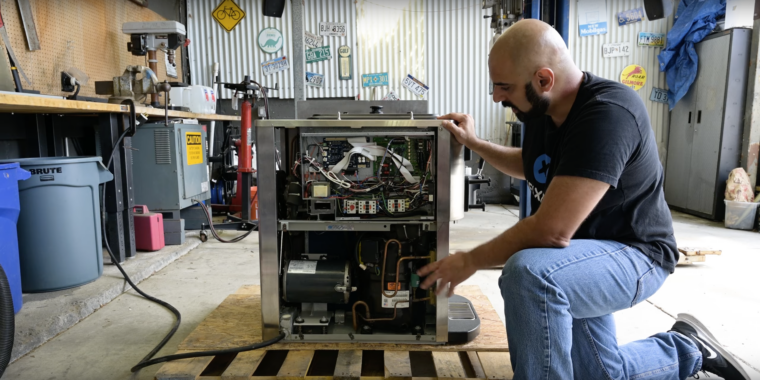McDonald’s soft-serve ice cream machines are regularly broken, and it’s not just your perception. When repair vendor and advocate iFixit was filming a video about the topic, it checked tracking map McBroken and found that 34 percent of the machines in the state of New York were reported inoperable. As I write this, the nationwide number of broken machines is just above 14 percent.
To improve the nation’s semi-frozen milk fat infrastructure, iFixit has done two things. One, as first reported by 404 Media, is to join with interest group Public Knowledge to petition the Copyright Office for an exemption allowing people to fix commercial equipment, such as McDonald’s ice cream machines and other industrial kitchen equipment, without fear of reprisal under Section 1201 of the DMCA.
There’s a comment at the end of the article explaining that the McDonald’s machines are somewhat unique in having a nightly pasteurization process that allows them to go two weeks between cleanings instead of requiring nightly cleaning like other machines.
Listeria is a risk if ice cream machines are not properly maintained. Recent case linked to ice cream machines: https://www.cnn.com/2023/08/20/us/tacoma-milkshake-listeria-deaths/index.html
Not that there are not clearly other issues at play. Just a couple important pieces of what’s going on that were not covered in the article itself.
And to be clear, they’re mostly down because the nightly boil of the ice cream mixture wasn’t completed due to overfilling the machine making it unable to reach the temp. The service company refuses to let the workers know that and the machine doesn’t volunteer that information.
So if there was a small window with a max fill line this problem would be solved?
There’s lots of ways that you could solve the problem. It’s not designed to be solved.
Or just a line stamped into the metal reservoir tub
It’s a request, not a demand
This ice cream machine saga is so bizarre…
It really isn’t once you understand the basics.
- Some company got a contract with McDonald’s to do all their ice cream machines, probably through a personal connection. This contract included expensive maintenance.
- The company made a shit product, probably to save costs. It both doesn’t work well and is a pain to service.
- McDonald’s has decided that the lost revenue is not as big of a deal as getting out of that shitty contract with a shitty company that made a shitty product.
That is all there is to it.
I’ve watched the fascinating YouTube documentary on it but it still seems crazy that the company is fighting so hard to stay shitty and terrible. They’ve attacked people trying to help too, like wtf?
That’s how you can make money. There’s a financial incentive to be a piece of shit many times, unfortunately.
Crapitalism: When you take capitalism and remove meaningful regulation.
You mean Neoliberalism, our current dark shade of Capitalism.
Whatever you call it, the end goal is always to make rich people richer while everyone else stagnates or loses.
This is the best summary I could come up with:
When repair vendor and advocate iFixit was filming a video about the topic, it checked tracking map McBroken and found that 34 percent of the machines in the state of New York were reported inoperable.
One tiny company had previously attempted to address the glut of broken, indecipherable Taylor machines and was duly ostracized for its efforts.
Taylor, which reportedly has an exclusive contract with McDonald’s for maintenance of its machines, moved quickly to make the use of a Kytch a contract-voiding, franchise-ending issue.
The saga, as reported by Wired, has taken a few intriguing turns, including Taylor’s creation of a competing product, revealing discovery emails, and a $900 million Kytch lawsuit.
Public Knowledge and iFixit have submitted a petition to the Copyright Office to argue that bypassing the digital security measures on commercial equipment such as Taylor’s machines should not be illegal.
“The fact that this principle is not already embedded permanently into law demonstrates that our copyright system is as McBroken as the average McDonald’s ice cream machine.” (Link added by Public Knowledge.)
The original article contains 716 words, the summary contains 175 words. Saved 76%. I’m a bot and I’m open source!
Not in the USA, but my password is my unique key that in cryptic my data, so therefore an FBI or any other agency is not allowed to pass it even if they could, no? As I’m the person who rode this password and therefore am the copyright holder of that password.
Not sure I understand your point.
Courts decide what a creative work is, not your personal attestation. Courts will not decide that your password is a creative work, in pretty much any context. You can’t copyright a password.







